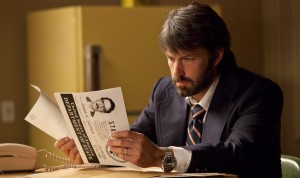Films fail to make significant political impact
Hot off of last week’s presidential debate, everyone has the November election on their minds. The Huffington Post cited the debate as the most tweeted event in U.S. political history, clearly showing that it’s easy to get a message — even one about Big Bird — across to viewers.

Risky business · Ben Affleck stars as Tony Mendez in Argo, the upcoming political thriller about the rescue of six U.S. diplomats during the height of the Iranian Revolution. Affleck also directed the film. – | Photo by Claire Fogler, courtesy of Warner Bros. Pictures
Unfortunately, recent political films haven’t quite managed to impact audiences to such a large extent.
Modern film is not short of political works. We have biopics, documentaries and many true stories recounting past and present events. But these films aren’t reaching the audiences they need to in order to influence today’s political climate.
In an election year, when filmmakers have the opportunity to take advantage of their creative medium to voice opinions and administer their influence, the political message is getting lost.
It’s about time that filmmakers and studios alike manned up, tackled contemporary politics and distributed these works far and wide.
But this isn’t happening right now and it can be attributed to two things: One, some films lack relevant content that relates to modern issues, and two, other films have strong opinions to share on the state of our world but fail to reach a broader audience.
Take period pieces for example. Steven Spielberg’s Lincoln is a biopic that follows the life of former President Abraham Lincoln in the wake of the Civil War. Ben Affleck’s Argo, in turn, documents the 1979 Iran hostage crisis.
These films are undeniably political in their subject matter, but don’t speak to the modern world. Lincoln and Argo deal with issues of race, war and international relations — all relevant issues — but audiences might not draw connections between the past and the present. Oftentimes, these themes simply fail to transcend into contemporary politics.
Small-scale, low-budget documentaries, in turn, face the opposite problem. Many documentaries tackle controversial modern issues, but don’t have the funding or distribution to get their strong points of view across to wider audiences. Writer-director Eugene Jarecki’s The House I Live In, for example, investigates the ongoing War on Drugs, arguing that the battle is not a superficial drug problem, but rather the result of a slew of socio-economic factors.
Here, the problem lies not in content but in distribution. In fact, Jarecki’s point of view is so strong that at times the film feels heavy-handed as it attempts to garner sympathy from the viewer. The House I Live In sets out to say something about the state of our world, and it does — but it only screened in two theaters, bringing in a mere $16,453, according to Box Office Mojo. Again, the political sentiment is there, but if hardly anyone sees the film, how much of a difference can it make?
The House I Live In doesn’t stand a chance against Lincoln or Argo, which are backed by big names and even bigger studios, nor does it have the same credibility as Academy Award-winning director Kathryn Bigelow’s upcoming Zero Dark Thirty.
But, strangely, Zero faces the biggest issue of all.
This film is controversial in its subject matter, tackling the killing of Osama Bin Laden, and has the name and distribution to make it accessible and well-known. Yet, Zero stands as a testament to cinema’s failure to push the limit with political films, as it caves instead to the studio system and political pressure. At its simplest, Zero — and the team behind it — is a pushover.
The much-anticipated film was scheduled to hit theaters before the upcoming presidential election, but was later pushed back to Dec. 19 — mostly because of accusations that the filmmakers had access to classified information about the attack and because it wanted to avoid being seen as a propaganda piece.
I don’t know the filmmakers’ political affiliations, but Zero serves as the perfect platform for the creative team to use their power to say something that could potentially affect the election. If the filmmakers support President Barack Obama’s re-election, the film could take a congratulatory tone, and if they don’t, the film could be more critical. Instead, Zero shies away from the election, when it should be tackling the issue head on.
Of course, filmmakers aren’t completely to blame. There’s an entire studio system working against controversial films. The film industry is a business after all, and accordingly studios and filmmakers alike have to take political pressures into consideration.
I don’t think the team behind Zero is composed of a bunch of cowards. Film as a medium, however, should be used to express strong, and sometimes unwelcomed, opinions. If these views can’t be expressed when they’re meant to be expressed — in this case, before the election — then, to some degree, the industry is enabling censorship.
Not all political films have to reflect upon the modern state of politics, but in an election year, filmmakers need to create publicly accessible works that are relevant to today’s economy, social issues and international relations. Here’s hoping for that four years from now.
C. Molly Smith is a junior majoring in communication. Her column “Keepin’ it Reel” runs Wednesdays.
